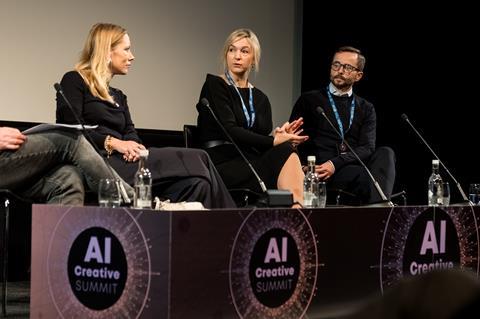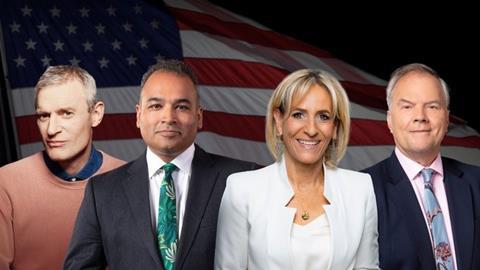BBC, C4 and ITN explain how they are using the emerging tech at AI Creative Summit

The BBC, Channel 4 and ITN have laid out the ways in which they are exploring AI and indicated there is an increasing appetite for a collaborative, pan-industry approach to the emerging technology.
At the AI Creative Summit, organised by Broadcast publisher MBI/GlobalData, Channel 4 director of technology Grace Boswood, head of AI research at BBC R&D Danijela Horak, and ITN director of technology, production & innovation Jon Roberts set out their stall.
Roberts said there is a greater sense of collaboration around AI between the British TV industry’s major players “than anything I can remember”.
He said: “Last year the conversations [around AI] were informal and almost secretive, when there were various working groups set up. It’s now becoming increasingly formal and there’s a transition to organised groups trying to form clear policy objectives.
“Some of the things we’re talking about here in terms of proof of concept might feel slightly over the horizon, but those policy conversations are very real and very today – around training data, IP, search, prominence. We’re pleased to be part of those well-formed groups.”
Boswood added that C4 and ITN are talking about AI and that the BBC’s Gen AI programme “has been very helpful”.
She said: “It’s really important we all have a common purpose, but it is complicated. We all have to live our own values and work out how we come together in order to implement policy.”
The BBC’s Horak added that the European Broadcasting Union “has been active in this space and is leading some of these conversations”.
The three organisations were asked about how they are using and exploring AI.
Boswood explained that C4 is taking a “thoughtful” approach that will “allow us to do more with less” without ushering a revolution in terms of how it creates content.
AI is being used to help with tasks such as personalisation of social media content, for example. “We have an infinite scope to personalise our content, but we don’t have an infinite number of people to create clips,” she said.
She also indicated C4 is working with Aardman and immersive experience specialist Charisma.ai on a pilot that is intended to explore how AI can be used to bring together and lower the barriers of entry for diverse voices. This is early-stage research around how AI can help with storyboarding, scriptwriting and getting content to screen.
At the BBC, generative AI is being tested as a tool for rewriting copy, provided by the 400 local journalists contracted to the corporation, in the style of BBC reporters. Typically, resource constraints mean only around 10% of the copy is repurposed and the remainder is discarded.
Horak explained the corporation has created a training model to rewrite copy that would then go to a human sub-editor before being published. “We are very happy with the initial results and hopefully it will be deployed in Q1 next year,” she said.
She said existing commercial tools could not replicate that style, tone of voice and vocabulary of BBC output, but by “training the model on millions of BBC articles we found a distinct difference”.
She added that “a big focus this year” is research into deepfake detection by AI, with a focus on explainable tools.
Lots of available tools are around 80% accurate and Horak said it is important that the AI can explain how it arrived at its assessment of the veracity of an image, for example.
The BBC is partnering with the University of Oxford on this project and is expecting the results relatively soon.
ITN is exploring how AI can improve production and efficiency in workflows. Roberts said the company is “naturally cautious” around content generation given its news background and how important trust is to its business.
It created a handful of working groups last year to surface opportunities, risks and threats. This work has resulted in several areas of activity, including tools that can better tag, protect and manage its archive, as well as “an awful lot around spreadsheets and data management”.

Roberts said ITN had introduced a chatbot to handle HR policy which it is now looking to build out to other areas. It has also built its own transcription platform, which was used in its coverage of the US elections. “AI didn’t touch anything else that night,” Roberts emphasised.
He said the organisation is also working with the BBC and others to develop agents that could be used in live production in the future. AI agents are autonomous intelligent systems performing specific tasks without human intervention.
“We want to see if we can make an agent thrive in a really challenging live production environment,” he said.








No comments yet